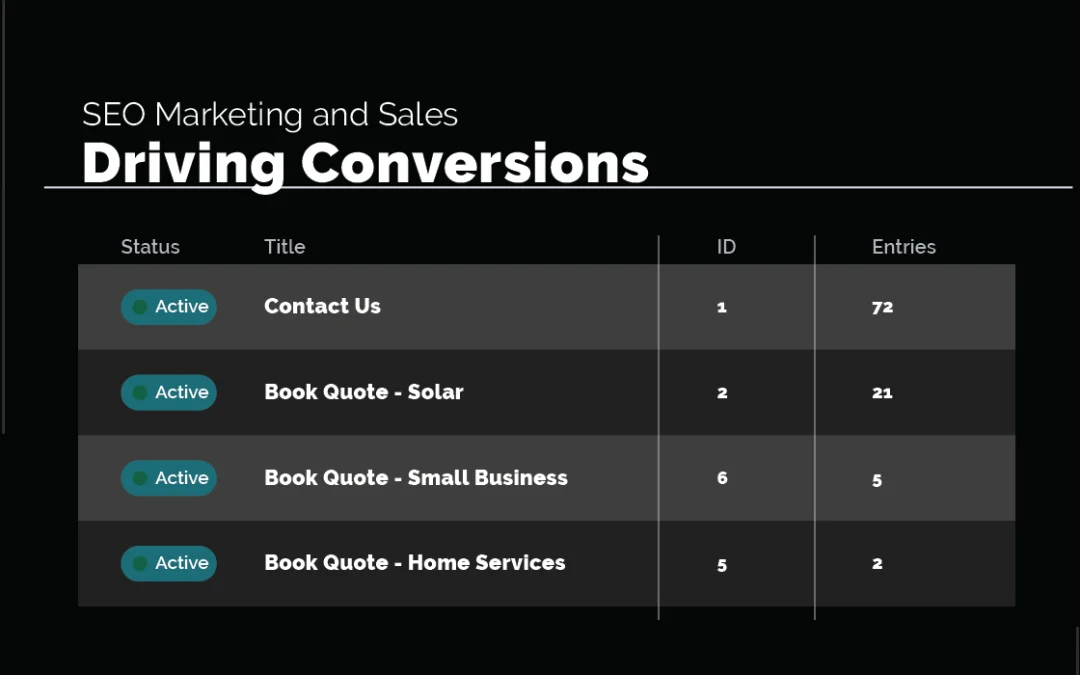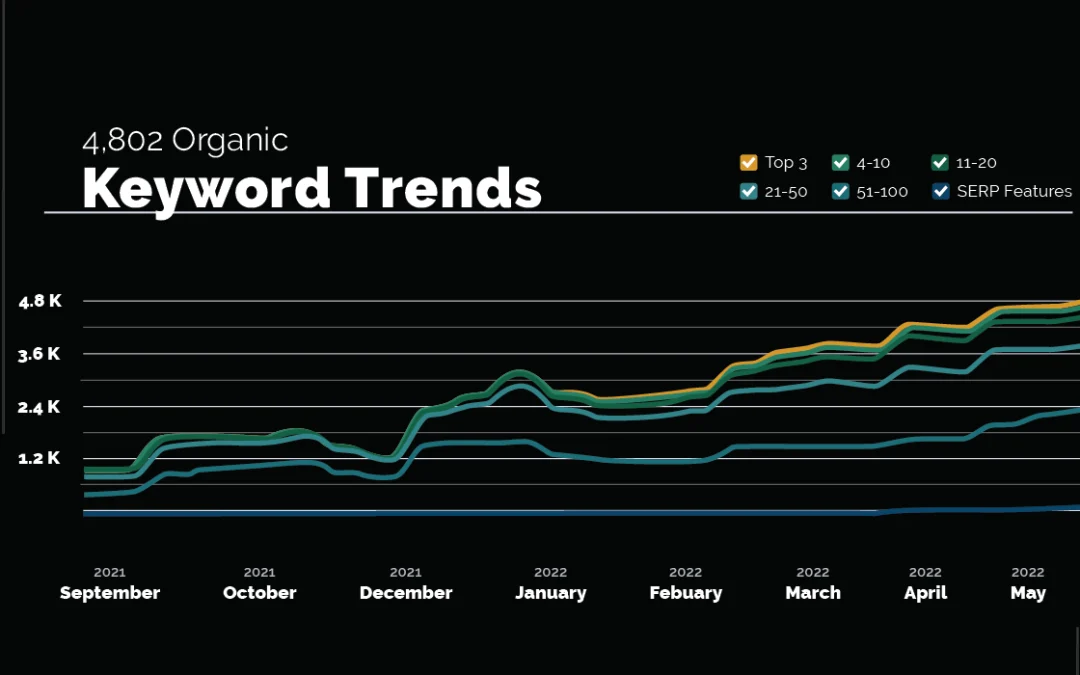SEO is no longer a buzzword; it’s a business necessity. Consider this: 68% of online experiences begin with a search engine1, and 53.3% of all website traffic comes from organic search2. The ramifications are clear: businesses that ignore SEO are effectively turning a blind eye to a massive chunk of potential customers.
As experienced developers of ”rank and bank” SEO strategies that elevate visibility and drive conversions for our partners, the team at Monochrome Marketing is here to help you learn exactly what to expect when starting an SEO campaign for your brand. Below, I’ll explain the key elements your campaign should include, how to effectively validate your strategic decisions with reliable data, and what metrics you should use to evaluate your campaign’s success.
Content & Technical SEO: The Essentials of Every Effective Strategy
Content and Technical SEO must work hand-in-hand for any SEO campaign to gain momentum and produce optimal results. They’re both important, but I’m going to cover technical SEO quickly and then mainly focus on content here—because content is the half that people often need the most help with.

Technical SEO At a Glance
Technical SEO is the process of optimizing a website’s infrastructure to help search engine spiders crawl and index it more effectively.
Examples of Technical SEO include:
- Ensuring your website is mobile-friendly
- Optimizing your site’s loading speed
- Creating an XML sitemap for search engines
- Implementing SSL for website security
- Using canonical tags to prevent duplicate content
- Structuring your website with clear and logical navigation
- Optimizing your website’s robots.txt file
- Managing 301 redirects and handling 404 errors properly
- Using structured data to enhance search engine listings
These steps might sound complicated, but they’re easy to replicate once you’ve completed them successfully a few times. Content, on the other hand, requires a much more intuitive approach—instead of following a list of steps, you have to create it based on your audience and their needs.

User Intent: The Key to High-Value Content
If technical SEO is the foundation for your website’s visibility, content is the building that attracts and retains visitors. However, for your content to do this successfully, it needs to be rooted in user intent. User intent is essentially the reason behind a user’s search query. Are they looking for information, trying to make a purchase, or seeking a particular website?
To deliver high-value content, you must understand what the user wants and align your content with it. This involves creating purpose-driven blogs, landing pages, and other forms of content that answer the user’s questions, solve their problems, or give them the information they need. It’s about providing valuable content that helps the user solve their problems, not just stuffing it with keywords.
Going Beyond Keywords with Human-Centric Content Strategies
The era of keyword stuffing is long gone. Today’s SEO is about writing for humans first and search engines second. Yes, keywords are important, but they should be incorporated naturally into the content, not forced.
Think of it this way: Google and other search engines are now smart enough to understand the context and relevance of your content, so you must focus on providing value and a good user experience instead of just trying to hit technical targets.

Matching Keywords to Content
Here’s a tip many people miss when trying to work keywords into their SEO content: consider what kind of content is the best match for different types of keyword strings. Not all keywords are created equal; the type of keyword you’re targeting dictates the kind of content that will rank most effectively for it.
Keywords typically fall into the following four categories:
- Informational Keywords: Used by people seeking knowledge or answers. These are queries like “how to declog a drain” or “what is SEO”. For these types of keywords, blogs or in-depth articles are the best fit.
- Transactional Keywords: Indicate an intention to make a purchase or perform a transaction. An example would be “Plumber SE Calgary”. For these keywords, your website’s homepage, product pages, or Google Business Profile are more likely to rank effectively.
- Commercial Keywords: Used by people who are looking to buy a product or service but are still in the decision-making process. These might include “best smartphones 2023” or “top SEO agencies in Calgary”. Comprehensive product reviews or comparison articles are often the best match for these types of keywords.
- Navigational Keywords: Used when people are trying to locate a specific website or page. For instance, “Monochrome Marketing blog” or “Amazon login”. These keywords are best served by ensuring your site’s navigation is clear and your pages are properly indexed.
We’ve written a lot elsewhere about the core principles we use when creating our content strategies. Learn more with the following resources, or keep reading to learn how to support your SEO campaign once you have a solid grasp of the two elements covered above:
- What Is Rank & Bank (& Why Is It a Core Component of Our Long-Term SEO Strategies)?
- The Connection Between Education and Sales: Why Providing Value is Better than Direct Selling
Freedom Within Structure: Tips & Tricks for Leaner, Meaner SEO
User intent should be the focus of your content, but there are other things you’ll need to do to make it perform if you want your SEO campaign to be successful. Here’s a primer on how to back up your content and give it a boost:
Digital PR & Verticalized Development
To bolster your SEO content, it’s essential to integrate Digital PR and verticalized development into your strategy. Digital PR involves building relationships with online influencers, bloggers, and press outlets to gain high-quality backlinks and social media mentions. This not only increases your brand’s visibility but also adds credibility and authority to your site in the eyes of search engines.
Verticalized development, on the other hand, refers to creating content and strategies specific to each vertical (or category) within your industry. This approach ensures that your content is highly relevant to your target audience and increases the likelihood of ranking high for specific keywords within your vertical.

Backlink Development in the Age of Generative Search
As search engines become smarter and more advanced, backlink development continues to play a crucial role in SEO. With the advent of generative search—where search engines generate answers to queries instead of just providing links—having a robust backlink profile is more important than ever. High-quality backlinks signal to search engines that your content is valuable and trusted, which can greatly improve your site’s ranking.
Clear Timelines & Budget Breakdowns
Whether you’re running an SEO campaign by yourselves or getting help from an agency like ours, you need to know how long each step will take and how much it will cost. Without visibility into how your budget is being spent and what it’s doing for you, you have no way of knowing how efficient your campaign is or when to expect results.
Clear timelines and budget breakdowns are not a luxury; they’re a necessity. They allow you to track progress, understand the value you’re getting, and make informed decisions about your SEO strategy.
Result-Centric Clear Actions
Each action in your SEO campaign should have a clear purpose. Whether it’s optimizing a page, creating a blog post, or building a backlink, it’s important to understand what each action is meant to achieve. This clarity ensures that your SEO efforts are focused and effective, and it allows you to measure and improve your strategy based on results. We’ll talk more about this later when we delve into KPIs.

Core Web Vitals
Website performance is a critical factor in SEO. Core Web Vitals—metrics that measure the speed, responsiveness, and visual stability of a webpage—play a significant role in Google’s ranking algorithm.
However, it’s vital to note that Google is expanding how they view these metrics. A page can technically fail a Core Web Vitals assessment—but if it still loads in an acceptable amount of time for most humans, Google’s rankings will take this into account. This is another great reason to prioritize user experience when optimizing your site’s performance.
Topical Authority
Building topical authority is a key aspect of a successful SEO strategy. This means becoming a trusted source of information on a particular topic or subject. If you’re following the steps above, you’ll likely build topical authority naturally, but it’s still helpful to know what criteria Google and other search engines use to assess it.
High-quality, relevant content is the backbone of topical authority. Your content should be:
- Concise: Get straight to the point and avoid unnecessary fluff.
- Clear: Make sure your content is easy to understand and digest.
- Direct: Address the user’s intent directly and provide the information they’re seeking.
- Referenced by Others: Earning backlinks and mentions from other reputable sources increases your site’s authority and credibility.
Using KPIs to Measure Your Campaign’s Success
Key Performance Indicators (KPIs) are vital for measuring the success of your SEO campaign—but just like keywords, not all KPIs are equally important. The KPIs you should focus on will vary somewhat between campaigns, but here’s a useful way to rank them for most cases:
1st Priority KPIs
It’s usually smart to prioritize KPIs that directly impact your bottom line. These include conversions (the number of visitors who complete a desired action), sales, and user sign-ups. These metrics are important because they give a clear indication of the return on your SEO investment.
2nd Priority KPIs
The second tier of KPIs focuses on organic traffic growth. This involves tracking the number of visitors who find your site through a search engine. A steady increase in organic traffic indicates that your SEO efforts are paying off and your visibility in search results is improving.
3rd Priority KPIs
Lastly, we look at KPIs related to brand visibility. This involves tracking your website’s rankings for targeted keywords and seeing how often your brand appears on the front page of search engine results. While these metrics may not directly translate to sales or conversions, they are essential for building brand awareness and credibility online.
SEO Isn’t Rocket Science (But It’s Also Not Pinball)
A lot of people are scared of SEO, but it’s not as complicated as it might seem. Not having perfectly optimized content isn’t going to make satellites fall out of the sky—but you also can’t just wing it like you’re slapping the flippers on that AC/DC pinball machine in your local pub.
Successful SEO campaigns require a strategy—and one that should involve far more than just optimizing your website’s technical aspects. You’ll also need to create high-value content that aligns with user intent, build a strong backlink profile, and establish your brand as an authority within your market.
For professional help with any of the above, reach out to our team at Monochrome Marketing. From clear timelines and budget breakdowns to prioritizing the right KPIs, we ensure that every step of your SEO campaign is data-driven, transparent, and effective.
It’s time to leverage the power of SEO and unlock your brand’s full digital potential. Let’s start your SEO journey together.








